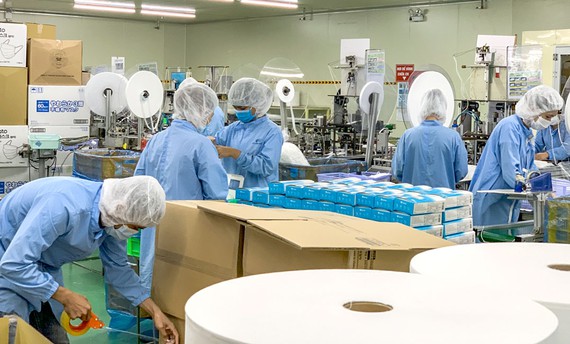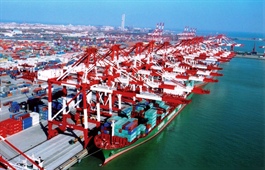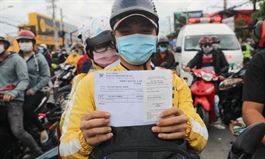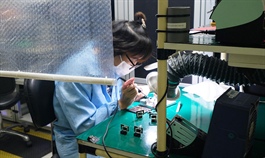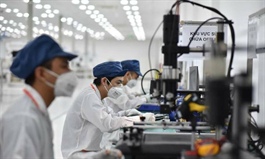Businesses want autonomy in fight against pandemic
Businesses want autonomy in fight against pandemic
The sincerest expectation of businesses when the economy is finally allowed to reopen again is to be given the right to autonomy and self-reliance, whereby businesses will be fully responsible for further prevention of the pandemic as well as run their own business operations.
Ilustrative photo. |
In a talk with Saigon Investment, Mr. TRAN THIEN LONG, Vice President and General Secretary of the HEPZA Business Association (HBA), said that this was an aspect that businesses are very focused on achieving.
JOURNALIST: -Sir, up until this point, how many workers in the 18 industrial zones and export processing zones (IZs, EPZs) of Ho Chi Minh City have been vaccinated and how are businesses currently operating?
Mr. TRAN THIEN LONG: - The IZs and EPZs have administered the first dose of vaccine to 267,990 to 288,161 workers, accounting for 93% workers, and the second dose has been administered for 107,604 to 215,000 workers, accounting for 50.4% workers.
The Hi-Tech Park has injected the first dose for 38,100 to 45,000 workers, and the second dose for a total of 29,206 workers. For a number of workers in the province, approximately 45,000 people, we have a proposal for them to return to Ho Chi Minh City for the second dose on time, but this is facing some difficulties. Therefore, in the neighboring provinces such as Binh Duong, Tay Ninh, Dong Nai, Long An, and Tien Giang, we propose to have mobile injection trucks to administer the second dose of the vaccine to the remaining workers.
As for the production and business activities of enterprises in the 18 IZs and EPZs, most of them are currently operating under the models of "three on the spot” or "one route two destinations". Some enterprises in the industrial zone in District 7 and Cu Chi have registered to pilot the “green 4 models”. The fact is that the implementation of "three on the spot” or "one route two destinations" needs to be changed quickly because businesses are not only suffering from increased costs and reduced capacity but also are worried about the mental and physical health of workers who have to stay at the enterprises for several consecutive months. If they still have to continue to produce according to this model, the majority of workers at enterprises will probably be exhausted.
-Sir, it is known that the “green 4 models” of enterprises in the industrial zone in District 7 and Cu Chi are piloting, but most other enterprises have not been able to implement it. Can you share with us something about this problem?
- A new feature of the green production option is that "green workers" can travel by personal means between "green workplaces", "green residences" along "green roads". This is a model expected by many businesses because employees will be comfortable working at the factory when they can return home after working time.
However, the production implementation under this model has many shortcomings, such as the incomplete updating of vaccination data, so the administration of the vaccine green card is incomplete. In addition, most of the workers working under "three on the spot” or “one road two destinations" models at factories have only had the second vaccine dose for about a dozen days, so they are not eligible for a green card as after vaccination it takes 14 days to make antibodies. Added to this is the untimely updating of the green area on the map, the lack of synchronization between the vaccination data by the Ministry of Health, and the data on police movement. This lack of synchronization makes it very difficult for businesses to update vaccination data due to such a large number of workers.
-Sir, Ho Chi Minh City will gradually reopen the economy in phases. How are the enterprises in the IZs and EPZs preparing, and what recommendations do you want to send to the authorities?
- Most businesses up to this point have made their own plans to best prepare for business activities when Ho Chi Minh City reopens the economy. However, in the situation when we all have to live with Covid-19, the efforts of enterprises alone are not enough, and it is necessary to have the support of central and local authorities as well.
Listening to the thoughts of businesses, we have some recommendations. Firstly, there should be specific regulations in the prevention of the pandemic in all enterprises. Enterprises want to be fully autonomous and take responsibility for prevention of the pandemic at their own units for which they want to create new conditions. The authorities will be able to post-check and those businesses not complying with strict preventive measures will be held responsible. Enterprises also want to have new regulations when detecting F0 in the factory, not necessarily by closing the entire factory, but being able to monitor a zone or area, and allow safe areas to continue with production.
Secondly, during the past few months, many businesses have faced difficulties in collecting data. HBA recommends the city build storage areas or field hospitals in IZs and EPZs with conditions for establishing them the right way. This will not only be convenient and bring peace of mind to businesses in production, but businesses will also help employees feel secure when working at factories in new conditions. We also recommend that management agencies have a unified focal point in receiving and handling issues related to pandemic prevention and control. It is necessary to unify the use of information related to vaccination on one app so that enterprises can easily update and register new production models. It is essential to enhance the digitization of administrative procedures in a synchronous manner to create the best conditions for enterprises to do business.
In coming time, HBA will focus on promoting digital transformation solutions for businesses with the program "Developing Digital Businesses" to support businesses to maintain and develop production and business, human resource management, application of technology platforms into employee welfare programs and trade connections, building of supply chains and promoting trade for businesses not only in the domestic market but also reaching out to the global market.
Another challenge that businesses will face when the economy reopens is the fact that many workers have returned to their hometowns during the lockdown. In order to solve the problem of labor shortage at enterprises, we propose to create conditions for workers to return to Ho Chi Minh City and receive two vaccination doses. Finally, there is a suggestion regarding regional affiliation. If Ho Chi Minh City reopens, businesses go into production under new conditions, but other provinces and cities have not yet opened their doors to businesses, and the supply chain disruption cannot still be resolved. In fact, each province has implemented a different implementation in the past, causing many difficulties for businesses. Therefore, in the new situation, it is necessary to join hands and link with Ho Chi Minh City and neighboring provinces and cities to create the best conditions for all businesses.
- Thank you very much.


